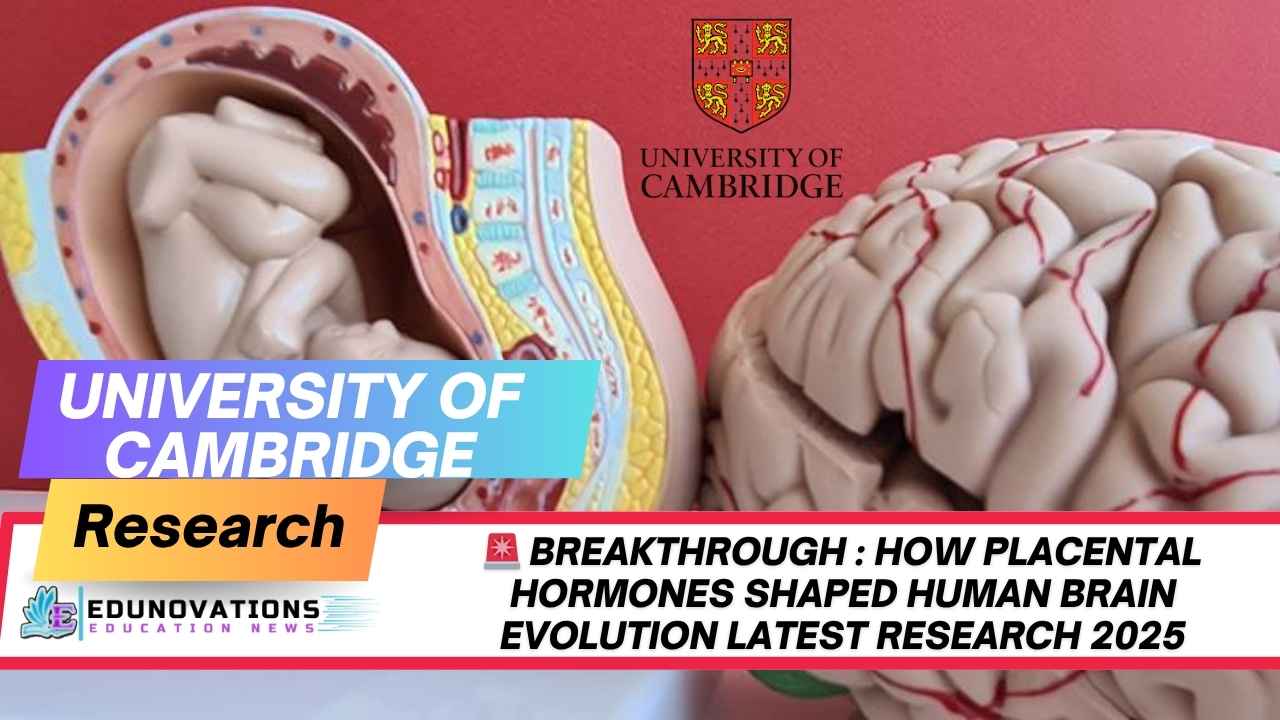Discover how placental hormones shaped human brain evolution and influenced cognitive development through prenatal hormonal interactions.
In a groundbreaking revelation that may redefine our understanding of human development, researchers at the University of Cambridge have unveiled new insights into how placental hormones shaped human brain evolution was significantly influenced by the hormonal environment in the womb. This evolutionary study sheds light on the prenatal factors that may have played a vital role in shaping our cognitive abilities and social behaviors.
The Placenta’s Surprising Role in Evolution
Traditionally seen as a temporary organ that simply nourishes the fetus, the placenta is now at the forefront of evolutionary biology. According to recent research, the placental hormones shaped human brain evolution connection suggests that steroid hormones like estrogen and testosterone might have acted as key influencers in shaping brain size, structure, and behavior before birth.
The study led by scientists from the Centre for Trophoblast Research found that hormone levels in the placenta varied widely in human pregnancies compared to other primates. These differences potentially contributed to increased brain volume and complexity, especially in areas linked to communication, empathy, and social learning.
Hormonal Interactions and the Social Brain
One of the most groundbreaking revelations from the study is how placental hormones shaped human brain evolution by actively influencing the brain’s ability to support social interaction and emotional intelligence. Researchers identified a direct correlation between prenatal hormone activity—especially estrogen and androgen levels—and the growth of the “social brain network,” a set of interconnected brain regions involved in interpreting emotions, recognizing faces, managing empathy, and forming social bonds.
This is particularly significant in the context of human evolution. Unlike other mammals, human beings rely heavily on complex social behavior for survival, collaboration, and education. The findings suggest that these cognitive traits did not simply emerge postnatally or through environmental learning alone, but were deeply embedded during fetal development—guided by hormone-regulated brain structuring.
Key Findings:
- Elevated prenatal estrogen and androgen levels were linked with enhanced social cognitive skills, suggesting that social aptitude has deep prenatal roots.
- Human fetuses demonstrated increased gene expression associated with steroid hormone signaling, a pattern less pronounced in other primates.
- The fetal human brain exhibited a unique response to hormonal instructions, which helped build neural frameworks necessary for emotional reasoning and cooperation.
In essence, the study underscores that placental hormones shaped human brain evolution not just by increasing brain size, but by refining specific regions responsible for uniquely human traits—empathy, emotional intelligence, and complex communication.
This interplay between prenatal biology and social behavior may have granted early humans a critical evolutionary advantage, allowing communities to function more cohesively, nurture young cooperatively, and develop sophisticated forms of language and culture.
A Deep Dive into Brain Growth Mechanisms
How does the placenta do this? Researchers found that placental hormones shaped human brain evolution through complex hormonal cascades initiated by the placenta. These hormonal signals instruct fetal cells when to divide, where to migrate, and how to specialize, particularly in the cerebral cortex—the seat of higher cognitive functions.
Highlights:
- Placental hormones influence cortical neuron density
- Hormonal changes correspond with neural network complexity
- Abnormal hormone levels are linked to autism spectrum traits
Hormone Variability and Evolutionary Success
Why do humans exhibit such wide variability in prenatal hormone levels compared to other species? Scientists believe that this flexibility might have offered an evolutionary advantage, allowing human offspring to adapt to diverse environments and social structures.
This concept aligns with recent research on steroid hormones in fetal brain development, emphasizing how even subtle changes in hormone levels can affect memory, attention, and learning capacity.
Reproductive Strategy and Cognitive Outcomes
Unlike most mammals, humans have a uniquely invasive form of placentation. This means the placenta penetrates deeply into the uterine wall, potentially offering more hormonal control over fetal development. This evolutionary adaptation might be one reason behind the prenatal estrogen testosterone human cognition link.
Data collected from human and primate pregnancies show:
- Elevated testosterone levels correlate with spatial reasoning
- Estrogen boosts language and memory-related neural circuits
- Balanced hormone interplay may optimize overall cognition
Evolution and Gene-Hormone Communication
New findings from the Cambridge team suggest that gene expression in the developing brain is tightly synchronized with placental hormone signaling. This synchronization appears to be a hallmark of human evolution, especially in the context of placenta-driven brain growth in humans.
Some researchers believe that this hormone-gene cooperation enabled:
- More efficient synaptic pruning
- Extended neurogenesis periods
- Greater adaptability in learning patterns
Toppers Use Mind Maps to score more than 95%
NCERT Class 11th Commerce Mind Maps
Add to cartOriginal price was: ₹999.00.₹199.00Current price is: ₹199.00.NCERT Class 12th Chemistry Mind Maps
Add to cartOriginal price was: ₹199.00.₹75.00Current price is: ₹75.00.NCERT Class 12th Commerce Mind Maps
Add to cartOriginal price was: ₹999.00.₹199.00Current price is: ₹199.00.NCERT Class 12th Science Mind Maps
Add to cartOriginal price was: ₹999.00.₹199.00Current price is: ₹199.00.NCERT Mind Maps For Class 10th
Add to cartOriginal price was: ₹999.00.₹199.00Current price is: ₹199.00.
Purchase Today
Expert Perspectives
Dr. Amanda Sferruzzi-Perri, one of the lead researchers, stated, “Our findings suggest that the placenta does much more than previously thought. It’s not just about nutrient delivery; it’s a conductor orchestrating brain development.”
Additionally, renowned evolutionary biologist Dr. Robert Sapolsky commented on the study’s implications via social media: “This research elegantly ties prenatal biology to evolutionary outcomes. Fascinating connections between placental function and cognitive diversity.”
Relevance in Today’s World
Understanding how placental hormones shaped human brain evolution operated over time could offer modern insights into developmental disorders, educational interventions, and even prenatal healthcare practices.
Implications include:
- Better prenatal screening for hormone imbalances
- Targeted interventions to support fetal brain health
- Enhanced understanding of gender-based cognitive differences
For Further Learning:
To explore more on educational advancements and brain-related research, check these resources:
FAQs on Prenatal Hormones and Brain Evolution
- What is the role of placental hormones in human brain evolution?
These hormones regulate fetal brain development and may have driven evolutionary increases in brain size and function. - How do prenatal hormones affect the social brain?
Hormonal cues influence neural networks responsible for empathy and social interaction. - What does placenta-driven brain growth mean?
It refers to the idea that the placenta actively guides fetal brain development through hormonal signals. - Can hormone levels before birth impact cognition?
Yes, variations in estrogen and testosterone can shape memory, language, and reasoning skills. - What are steroid hormones in fetal brain development?
These are hormones like estrogen and testosterone that regulate neural cell growth and connectivity. - Is there a link between prenatal hormones and autism?
Abnormal hormone levels may increase susceptibility to traits on the autism spectrum. - Do humans have a unique placenta?
Yes, human placentas are more invasive and offer enhanced control over fetal development. - Why do hormone levels vary so much in humans?
Variability may allow better adaptation to environmental and social conditions. - Are there gender-specific effects of prenatal hormones?
Testosterone is linked to spatial skills; estrogen supports language and emotional regulation. - How can this research help modern medicine?
It may improve prenatal care and early detection of developmental disorders.














